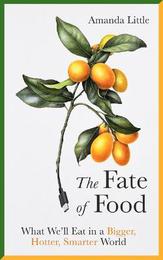
|
The Fate of Food: What We'll Eat in a Bigger, Hotter, Smarter World
Paperback / softback
Main Details
Description
We need to produce more food. With water and food shortages already being felt in some parts of the world, this might sound like an insurmountable challenge, but all is far from lost. You may not have heard about it, but the sustainable food revolution is already under way. Amanda Little unveils startling innovations from the front lines around the world: farmscrapers, cloned cattle, meatless burgers, edible insects, superbananas and microchipped cows. She meets the most creative and controversial minds changing the face of modern food production, and tackles fears over genetic modification with hard facts. The Fate of Food is a fascinating look at the threats and opportunities that lie ahead as we struggle to feed ever more people in a changing world.
Author Biography
Amanda Little is the author of Power Trip: From Oil Wells to Solar Cells - Our Ride to the Renewable Future. An award-winning environmental journalist, she has written for the New York Times, Vanity Fair, Rolling Stone , Wired and the Washington Post, among others. She teaches investigative journalism at Vanderbilt University and lives with her husband and children in Nashville, Tennessee.
Reviews'Timely, positive, thought-provoking.' * The Times * 'A riveting adventure story about a dire topic, but yet it somehow brims with optimism. Little travels around the world in hot pursuit of solutions, hell-bent on hope.' -- Julia Louis-Dreyfus 'What we grow and how we eat are going to change radically over the next few decades. In The Fate of Food, Amanda Little takes us on a tour of the future. The journey is scary, exciting, and, ultimately, encouraging.' -- Elizabeth Kolbert, Pulitzer Prize-winning author of The Sixth Extinction 'The challenge we face is not just to feed a more populous world, but to do this sustainably and equitably. Amanda Little brings urgency, intrigue and crack reporting to the story of our food future. Devour this book - it's a narrative feast!' -- Chef Jose Andres, Nobel Peace Prize nominee 'How will we feed humanity in the era of climate change? Amanda Little tackles an immense topic with grit and optimism in this fast, fascinating read. A beautifully written triumph.' -- John Kerry, former US Secretary of State 'Probably the most basic question humans ever ask is, "what's for dinner?" Amanda Little - a superb reporter - helps us imagine what the answer will be as this tough century wears on. The stories she tells with such brio are food for thought and action.' -- Bill McKibben, author of Deep Economy 'This is a big, important book about feeding the world - but that's not why you'll read it. You'll read The Fate of Food because it's compulsively readable. Amanda Little takes you around the world and shows you things you never thought you'd be interested in, but now you can't get enough. Desalination! Who knew? You'll taste fish feed with her. You'll get airsick with her. You'll meet the strange, fascinating people who are solving some of the planet's most pressing problems. And, in the end, her optimism will become your optimism. We can do this.' -- Tamar Haspel, Washington Post columnist 'Necessity is the mother of invention, observed Plato. Amanda Little investigates how environmental and population pressures are spurring innovation on a grand scale - with perhaps higher stakes and longer odds than history has ever seen. This is a big, sweeping story told with heart and rigor, as ambitious as it is accessible.' -- Jon Meacham, Pulitzer Prize-winning author of American Lion 'Perhaps the greatest challenge of our century will be providing nutritious diets to 10 billion people without destroying what is left of the biosphere. Can we do it? Yes. But Amanda Little shows us that success will look nothing like today's food system. The Fate of Food is spectacular. The stories are beautifully woven together and filled with curiosity, openness to new ideas, and compelling insights. This book is funny, smart, dogma-free, incredibly educational, and I think will end up being an enormously valuable contribution to the world.' -- Samuel Myers, professor and principal researcher, Harvard University Center for the Environment
|